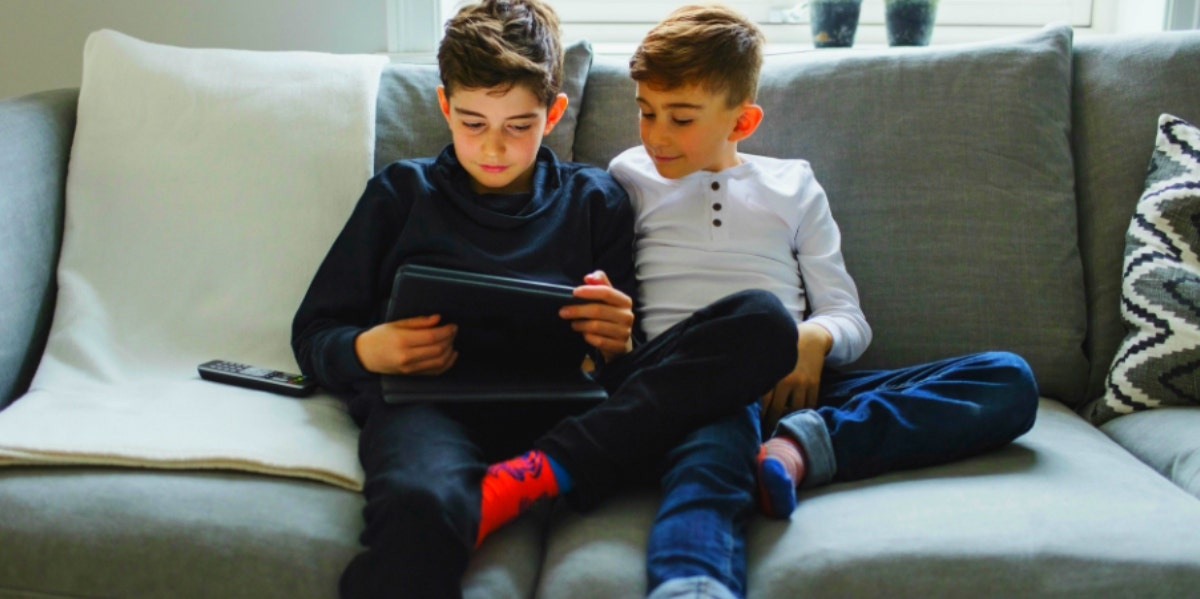How Distance Learning Has Reversed Challenges For My Son
Is online school the answer for ADHD and challenged learners?
 getty
getty The first day of school looked a lot different this year for many of us.
Children are trying to cope with the learning curve of "distance learning" over the internet, dealing with Zoom meetings, and attending virtual lessons instead of going to school.
But with the whirlwind of change, one thing that many people haven't considered are the benefits that come from distance learning — specifically in regards to kids who struggle with ADHD.
Other parents may have shed tears on the first day of school out of fear or concern for their child’s ability to be calm, well, and to succeed in their environment.
I certainly felt that way in years past. You see, my son has struggled his entire life in traditional, mainstream education.
With an early childhood form of epilepsy and the side effects of medications to manage it, the learning challenges of ADHD and social challenges of high-functioning Aspergers, school was anything but easy.
It was hard — even punishing at times.
We were always working on social skills and overcoming meltdowns — sometimes his, sometimes mine. There were some incredible teachers, classmates, and coaches who helped him feel accepted and part of a team.
Once his medical condition was under control, we focused on learning and took some risks that included leaving traditional education and academic learning to participate in a pilot program for cognitive functioning and brain training for three years.
We followed this with a year of small group-home schooling and distance learning before re-enrolling in public school. The fear and doubt of his ability to fit in and keep up was at times overwhelming for us both, namely because his biggest fear was bullying and teasing.
But he made it through his eighth-grade year and the next — though it was difficult at first. Two years at this small, public English school in Quebec, and he was OK. His grades were acceptable, borderline passing in a couple of classes.
Then, came a big change. We had to move to Texas, which meant he would start 10th grade at a school the size of a small college, because he didn't pass the entrance exam for the more intimate private school.
It was a blow to all of us. How would starting over socially translate here? We agreed to use what worked in the past: Let him be himself.
Let kids be themselves.
It worked, and he made friends right away with others who were quiet. None of them knew of his diagnosis or his struggles with ADHD.
It was helpful to have this small group, but he found the drama surrounding it to be too much at times, and would ask to stay home occasionally or ask me about the possibility of homeschooling and distance learning again.
By the next day, he would be ready to walk back in and cope.
When COVID disrupted the routine of all students and forced everyone into distance-learning scenarios, I worried again.
It seemed the tables had turned in the favor of kids like my son. They were accustomed to being on computers to game both independently and as groups.
For my son and others like him, these were acceptable, easy ways to communicate and get a sense of achievement.
I recall one game where a gold medal would appear, confetti would shoot across the screen, and his name would appear in colorful lights, and he would be cheered to the next level.
That didn’t happen so much in real life. He was the last one chosen for live games, he was physically clumsy growing up with delayed motor-skill development, and he often spent recess playing alone or with one other like-minded classmate.
He hated sports but tolerated baseball, because it was about as individual as it could be, yet still be on a team — which we required to help him develop socially.
Online school and distance learning were perfect for his needs.
Login, sit in his gaming chair at his gaming desk, and focus on the screen. No problem. Click, open, send, complete.
He can see it, he can track progress, the teachers can mute the participants controlling background noises and disruptions. He can focus on the spotlighted or featured speaker, and follow the structure typed for him and spoken to him. He’s got it.
In fact, he made all As the spring semester of his sophomore year with the required distance learning, and was ultimately inducted into the honor society. He made it to the next level, and he received a gold medallion on a scarlet ribbon in the mail to wear at his graduation in 2022.
Even if he doesn’t make all As again, this accomplishment will not be taken from him.
Who would believe this child who struggled to learn and fit in, who missed three years of academics, who failed the entrance exam for a local private school, and who barely passed a couple of subjects in traditional school a year ago would succeed in this way?
Since posting my son's first day of school photo on Facebook and commenting on how well he's done online via distance learning with ADHD, other parents have echoed the same for their child.
The question we are asking ourselves now is, will he return to traditional school when it re-opens? Yes, he will, and he will do so with a newfound confidence in himself and his abilities to be educated.
He may not make the same grades as he does online, and that is OK. He now believes in himself, and that gets an A every time.
Ann Papayoti, CPC, is a life and relationship coach helping people heal their hearts by untangling their past. For more information on how she can help you communicate better with your spouse, visit her website or connect with her on Facebook at SkyView Coaching.

